Instant Winner Hall of Fame
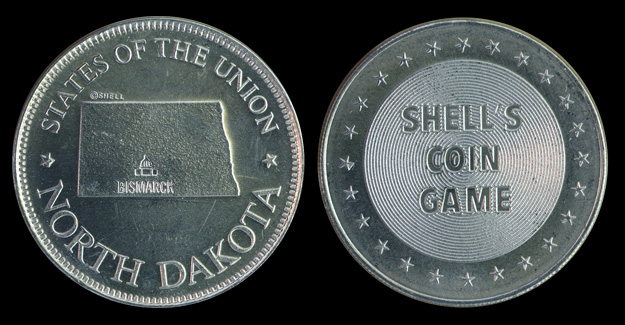
North Dakota, Prize-Winning Medallion, Shell's 'States of the Union' Coin Game (Version 1, 1969).
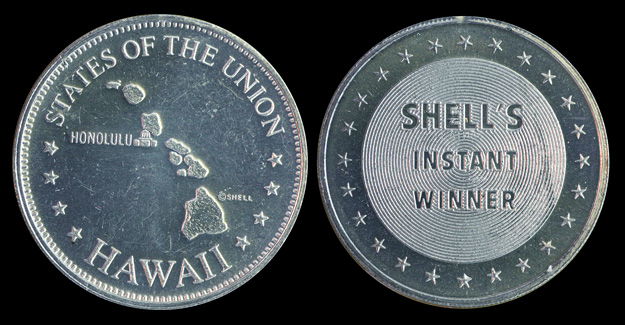
Hawaii, Instant Winner Token, Shell's 'States of the Union' Coin Game (Version 1, 1969).

Montana, Prize-Winning Medallion, Shell's 'States of the Union' Coin Game (Version 1, 1969).
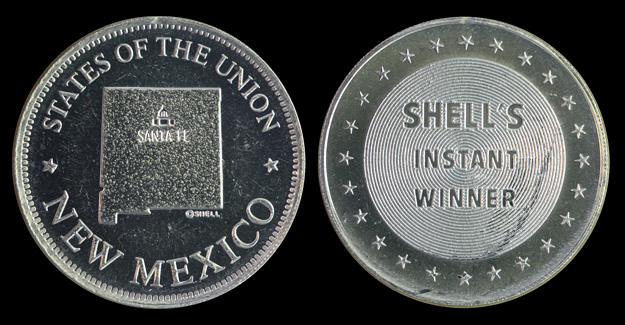
New Mexico, Instant Winner Token, Shell's 'States of the Union' Coin Game (Version 1, 1969).
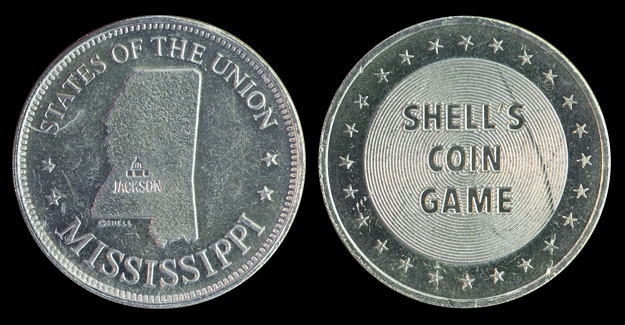
Mississippi, Prize-Winning Medallion, Shell's 'States of the Union' Coin Game (Version 1, 1969).

Alaska, Instant Winner Token, Shell's 'States of the Union' Coin Game (Version 1, 1969).
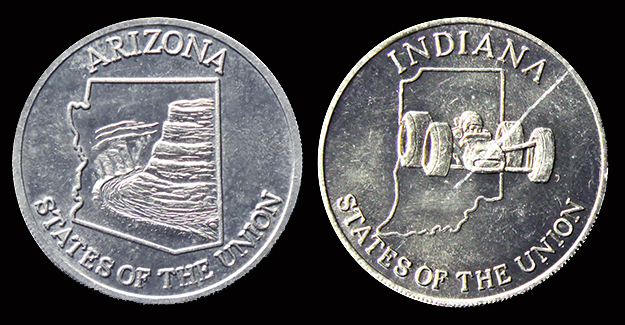
Arizona, Instant Winner Token, Shell's 'States of the Union' Coin Game (Version 2, 1969). Extremely rare.
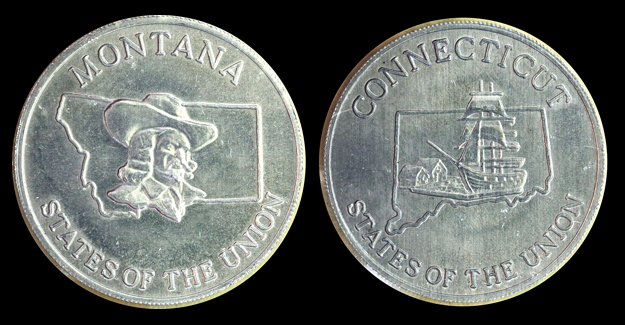
Montana, Prize-Winning Medallion, Shell's 'States of the Union' Coin Game (Version 2, 1969).
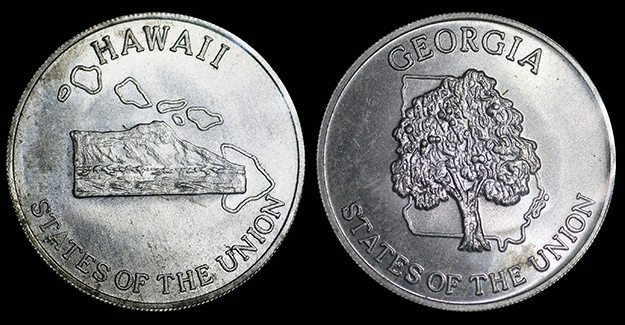
Hawaii, Instant Winner Token, Shell's 'States of the Union' Coin Game (Version 2, 1969).
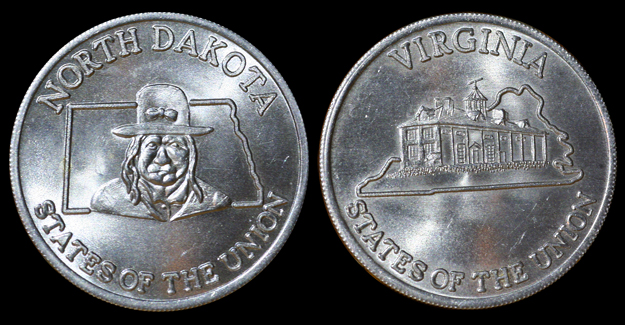
North Dakota, Prize-Winning Medallion, Shell's 'States of the Union' Coin Game (Version 2, 1969).
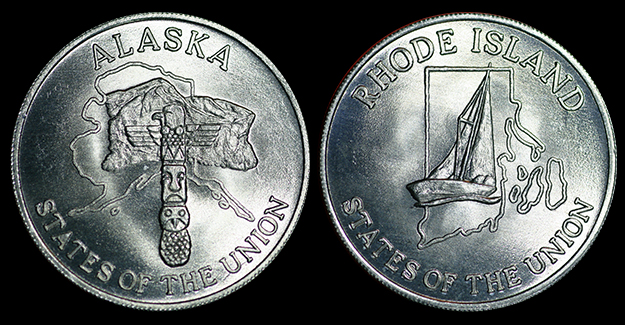
Alaska, Instant Winner Token, Shell's 'States of the Union' Coin Game (Version 2, 1969).
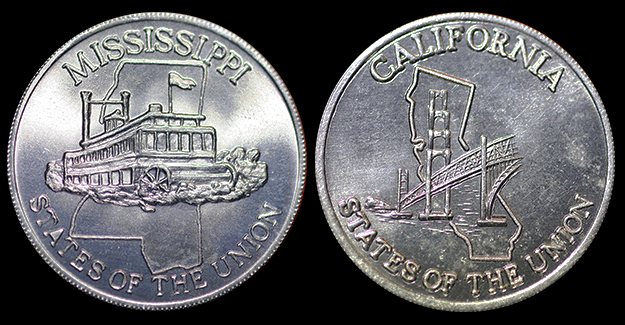
Mississippi, Prize-Winning Medallion, Shell's 'States of the Union' Coin Game (Version 2, 1969).
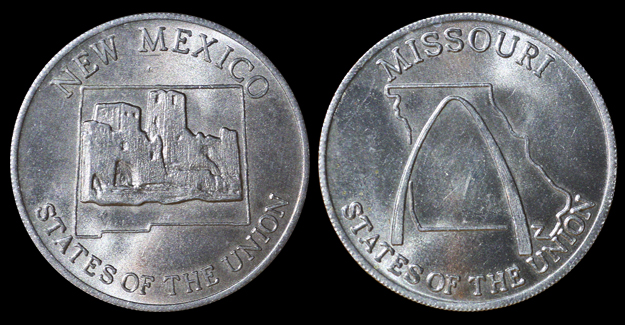
New Mexico, Instant Winner Token, Shell's 'States of the Union' Coin Game (Version 2, 1969).
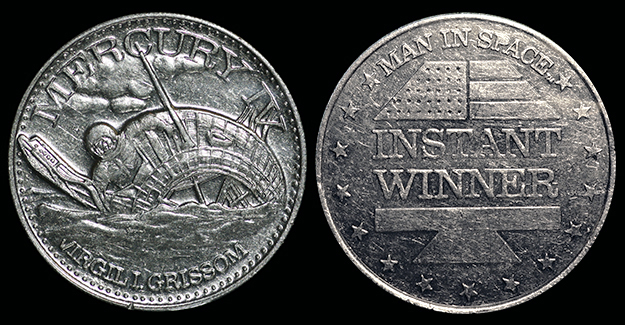
Mercury IV, Instant Winner Token, Shell's 'Man In Space' Coin Game (1969).
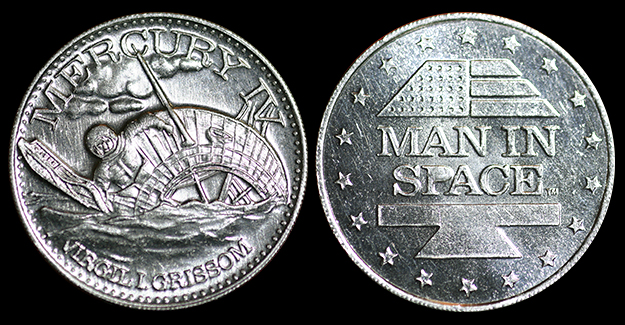
Mercury IV, Prize-Winning Medallion, Shell's 'Man In Space' Coin Game (1969).
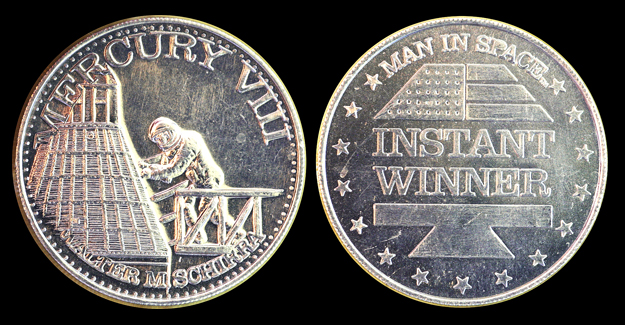
Mercury VIII, Instant Winner Token, Shell's 'Man In Space' Coin Game (1969).
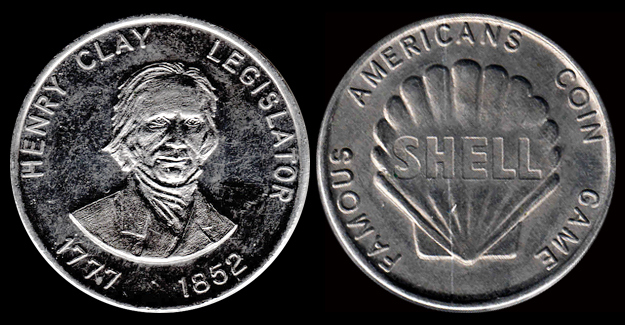
Henry Clay, Prize-Winning Medallion, Shell's 'Famous Americans' Coin Game (1968). Extremely rare.
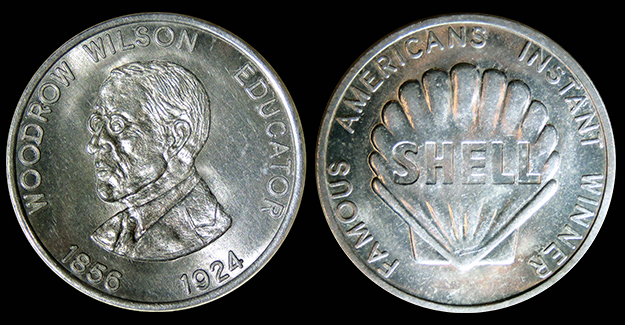
Woodrow Wilson, Instant Winner Token, Shell's 'Famous Americans' Coin Game (1968).
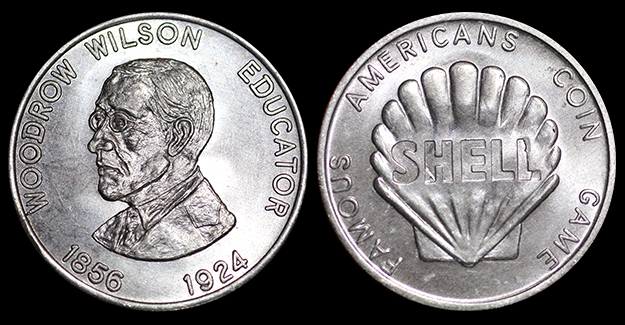
Woodrow Wilson, Prize-Winning Medallion, Shell's 'Famous Americans' Coin Game (1968).
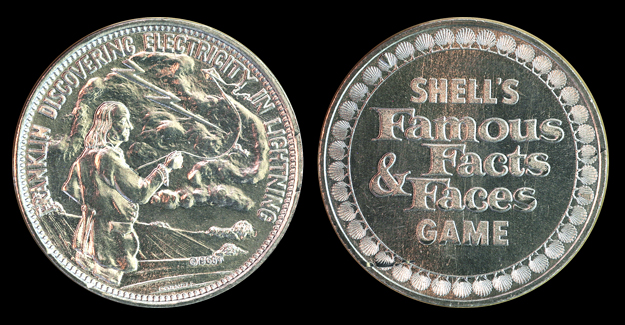
Franklin Discovering Electricity In Lightning, Prize-Winning Medallion, Shell's 'Famous Facts and Faces' Game (1968).
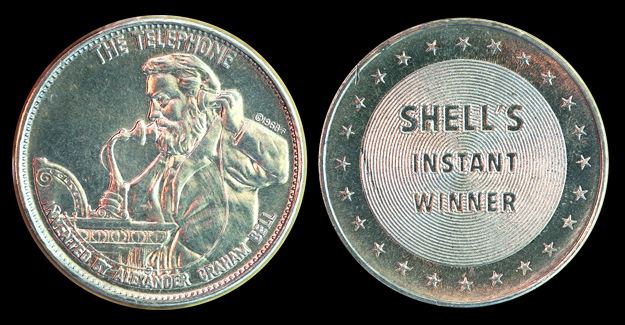
The Telephone, Instant Winner Token, Shell's 'Famous Facts and Faces' Game (1968).
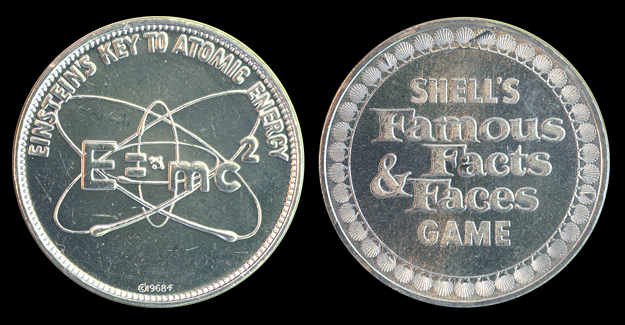
Einstein's Key To Atomic Energy, Prize-Winning Medallion, Shell's 'Famous Facts and Faces' Game (1968).
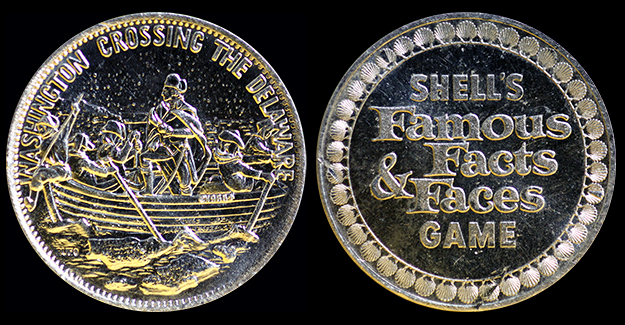
Washington Crossing The Delaware, Prize-Winning Medallion, Shell's 'Famous Facts and Faces' Game (1968).
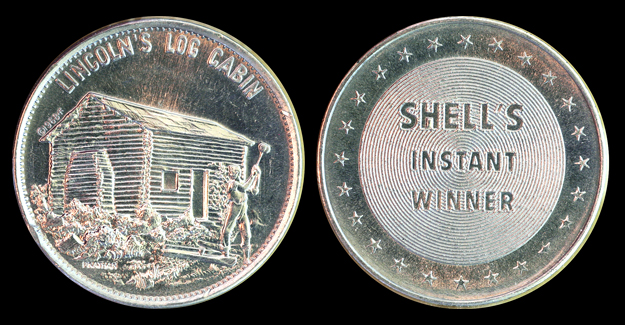
Lincoln's Log Cabin, Instant Winner Token, Shell's 'Famous Facts and Faces' Game (1968).
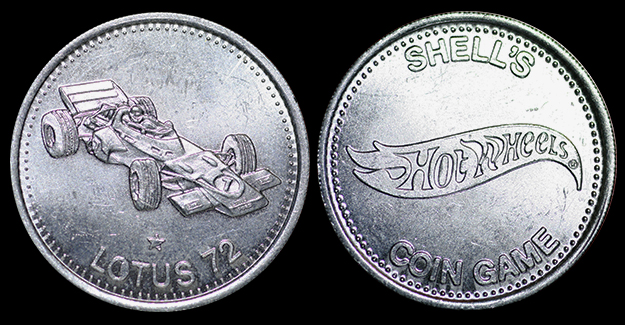
Lotus 72, Prize-Winning Medallion, Shell's 'Hot Wheels' Coin Game (1972).
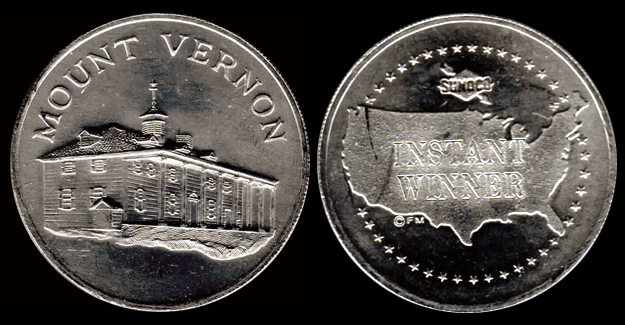
Mount Vernon, Instant Winner Token, Sunoco's 'Landmarks of America' Game (1969). Scarce.
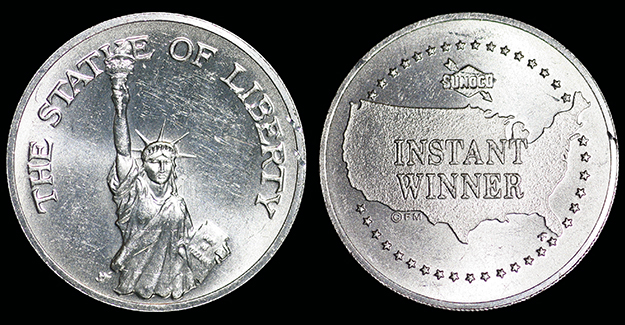
The Statue of Liberty, Instant Winner Token, Sunoco's 'Landmarks of America' Game (1969). Scarce.
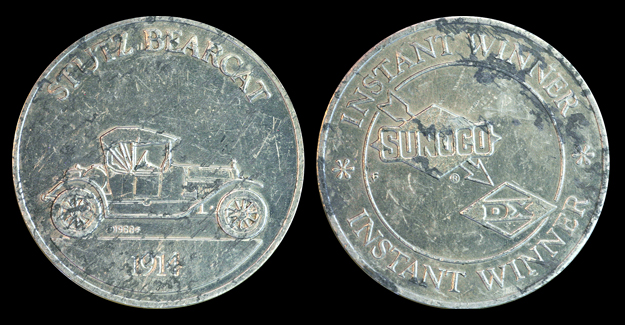
Stutz Bearcat, Instant Winner Token, Sunoco's 'Antique Car Coin' - Series 1 (1969).
Heavy surface oxidation has ruined the appearance of this coin. Regardless, it is extremely rare.
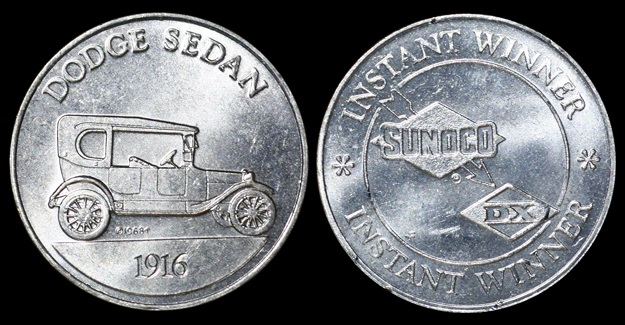
Dodge Sedan, Instant Winner Token, Sunoco's 'Antique Car Coin' - Series 1 (1969).
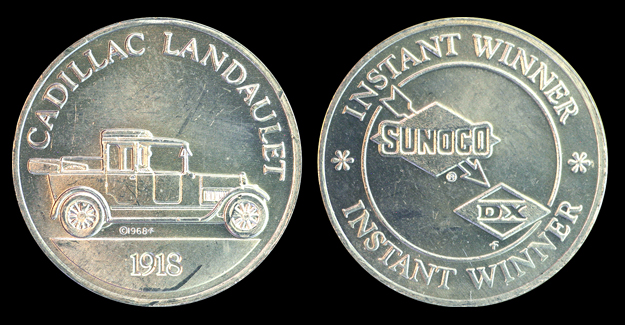
Cadillac Landaulet, Instant Winner Token, Sunoco's 'Antique Car Coin' - Series 1 (1969).
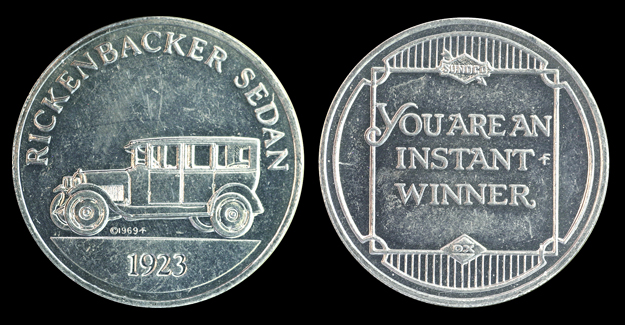
Rickenbacker Sedan, Instant Winner Token, Sunoco's 'Antique Car Coin' - Series 2 (1969).
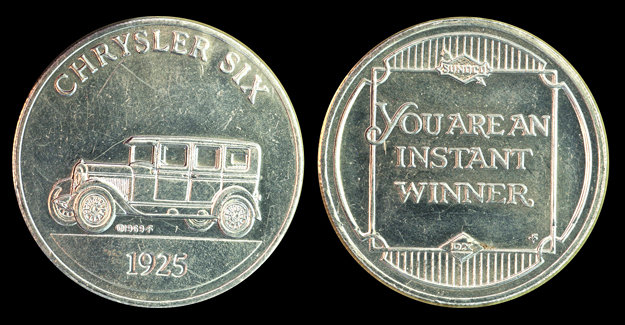
Chrysler Six, Instant Winner Token, Sunoco's 'Antique Car Coin' - Series 2 (1969).
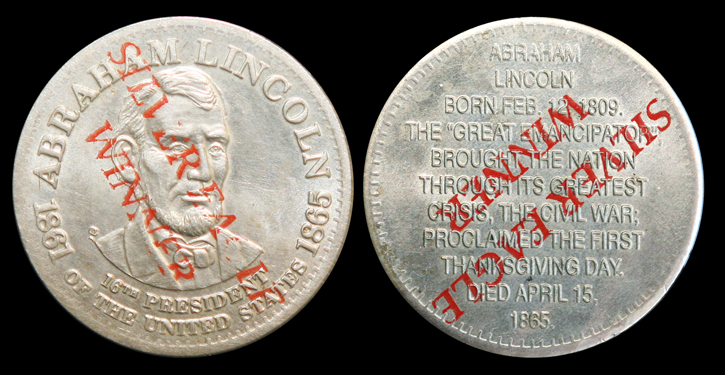
Abraham Lincoln Silver Eagle Winner, Instant Winner Token, Shell's 'Presidential Coin Game' (1992).
All instant winner tokens in this game were struck on nickel-silver planchets and over-printed with red paint.
This made them easily distinguishable from the regular game coins which were all struck on brass planchets.
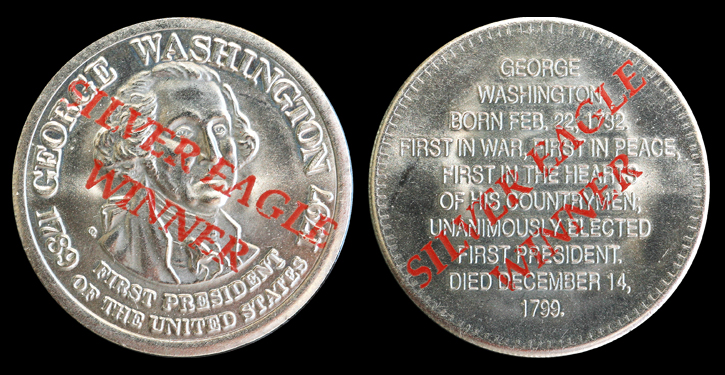
George Washington Silver Eagle Winner, Instant Winner Token, Shell's 'Presidential Coin Game' (1992).
All instant winner tokens in this game were struck on nickel-silver planchets and over-printed with red paint.
This made them easily distinguishable from the regular game coins which were all struck on brass planchets.
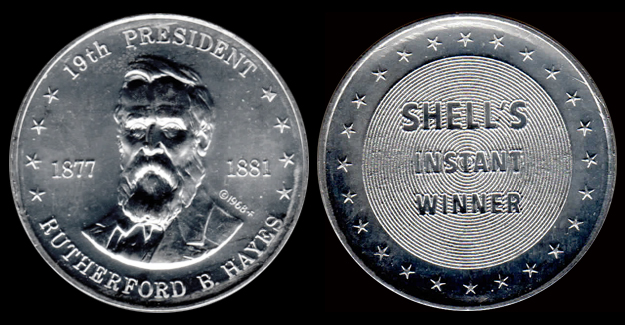
Rutherford B. Hayes, Instant Winner Token, Shell's 'Mr. President' Coin Game (1968). Extremely rare.
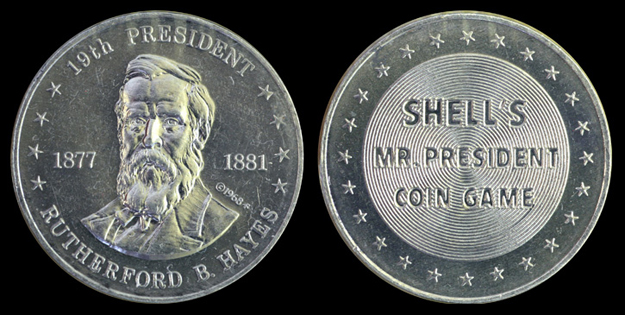
Rutherford B. Hayes, Prize-Winning Medallion, Shell's 'Mr. President' Coin Game (1968). Extremely rare.
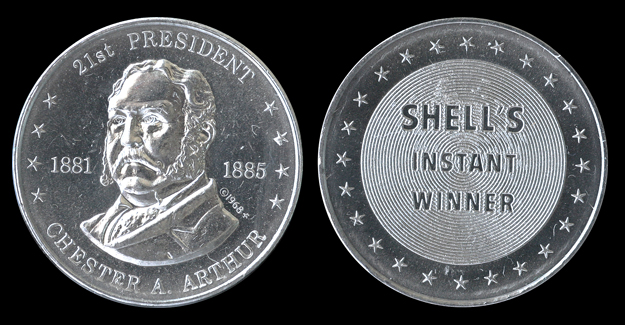
Chester A. Arthur, Instant Winner Token, Shell's 'Mr. President' Coin Game (1968).
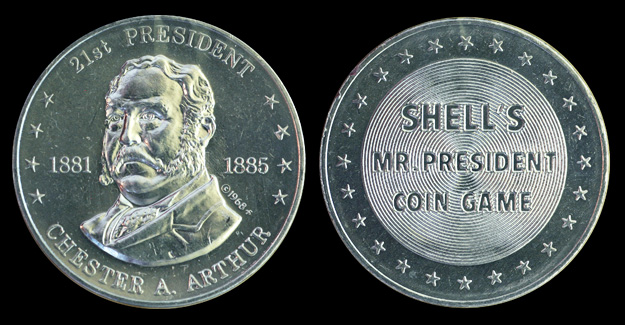
Chester A. Arthur, Prize-Winning Medallion, Shell's 'Mr. President' Coin Game (1968).
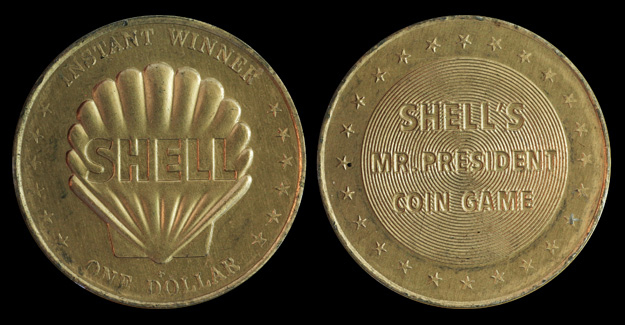
"One Dollar" Shell Emblem, Instant Winner Token, Shell's 'Mr. President' Coin Game (1968).
This is the only coin in the series struck on a gold-anodized aluminum planchet. It is extremely rare.
I am only aware of three of these tokens in existence.
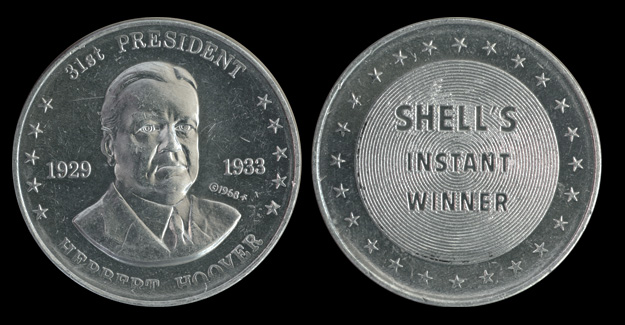
Herbert Hoover, Instant Winner Token, Shell's 'Mr. President' Coin Game (1968).
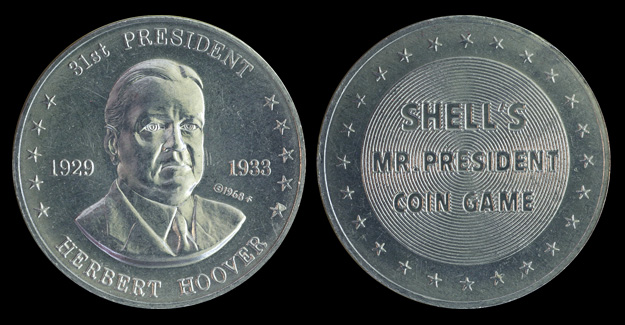
Herbert Hoover, Prize-Winning Medallion, Shell's 'Mr. President' Coin Game (1968).
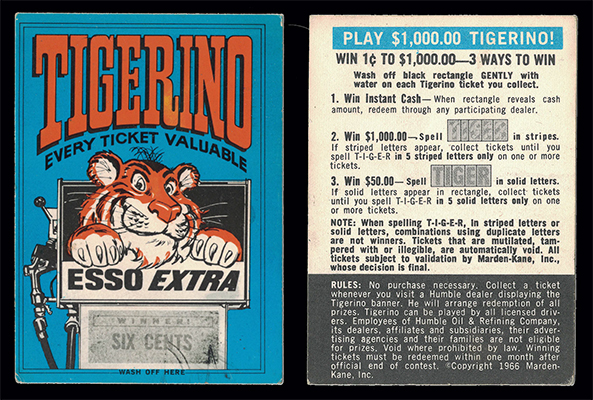
SIX CENTS, Instant Winner Game Card, Humble Oil's 'Tigerino' Game (Esso Version, 1966).
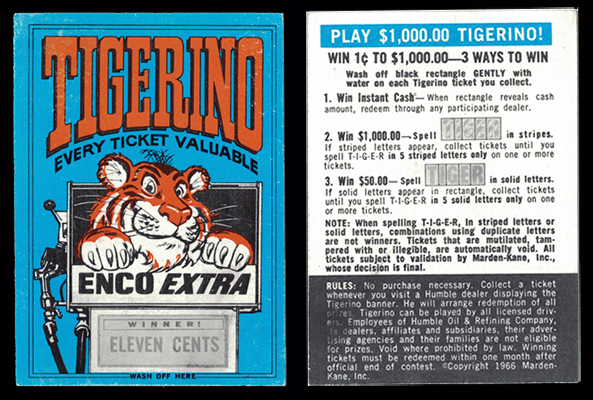
ELEVEN CENTS, Instant Winner Game Card, Humble Oil's 'Tigerino' Game (Enco Version, 1966). Scarce.
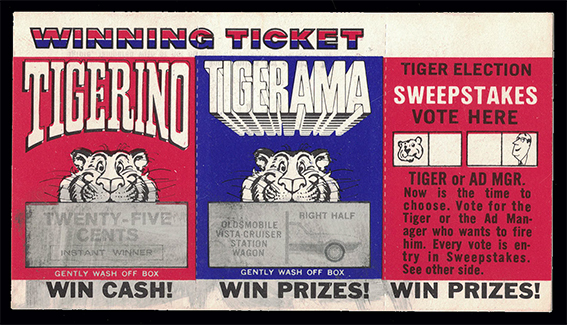
TWENTY-FIVE CENTS, Instant Winner Game Card, Humble Oil's 'Winning Ticket' Game (1968).
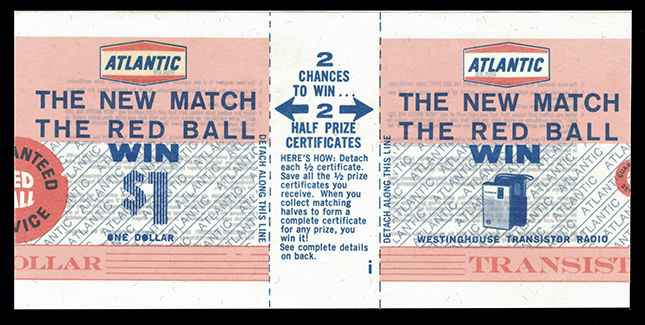
Winning Game Piece, containing the winning half (right half) of the $1.00 prize, Atlantic Richfield's 'Match the Red Ball' Game (1967).
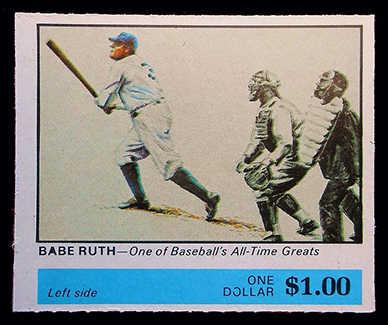
Winning Game Piece, left side of Babe Ruth, which is the winning half of the $1.00 prize, American Oil's 'Winners Circle' Game (1968).
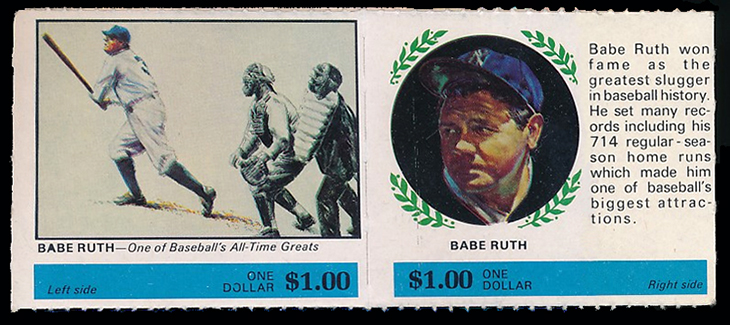
Babe Ruth, Instant Winner Game Piece, American Oil's 'Winners Circle' Game (1968). Scarce.
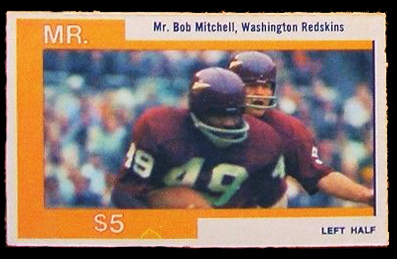
Winning Game Piece, Mr. Bob Mitchell, which is the winning half of the $5.00 prize, American Oil's 'Mr. & Mrs. NFL' Game (1968). Extremely rare.
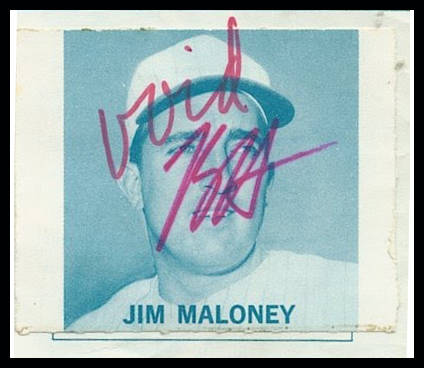
Jim Maloney, Winning Game Piece, Ashland Oil's 'Grand Slam Baseball' Game (1967). Extremely rare.
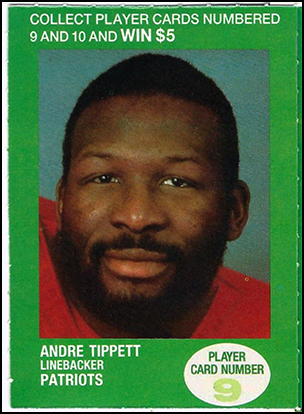
Winning Game Piece, Andre Tippett #9, which is the winning half of the $5.00 prize, BPs 'Match 2' Trading Card Game (1990). Scarce.
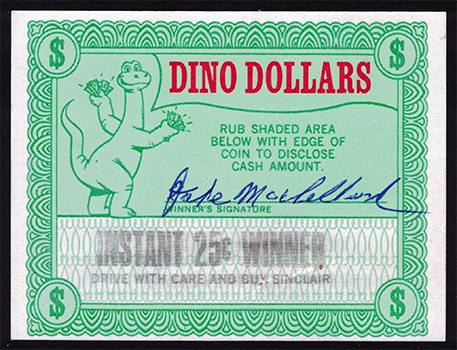
Instant Winner Game Piece, Twenty-Five Cents Prize (Version 1), Sinclair Refining's 'Dino Dollars' Game (1967).
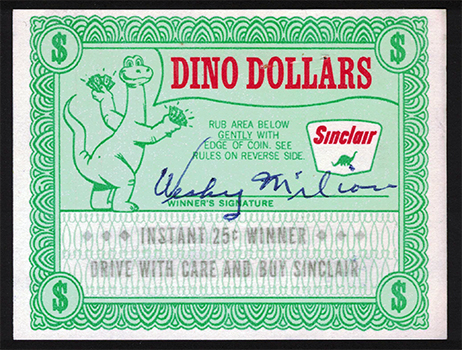
Instant Winner Game Piece, Twenty-Five Cents Prize (Version 2), Sinclair Refining's 'Dino Dollars' Game (1967).
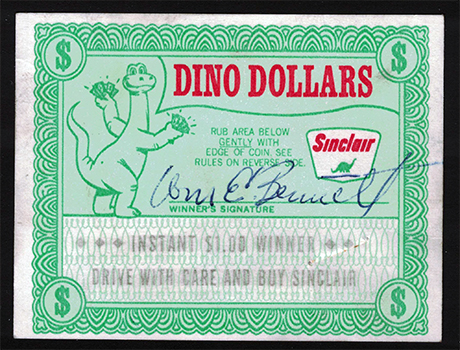
Instant Winner Game Piece, $1.00 Prize, Sinclair Refining's 'Dino Dollars' Game (1967). Scarce.
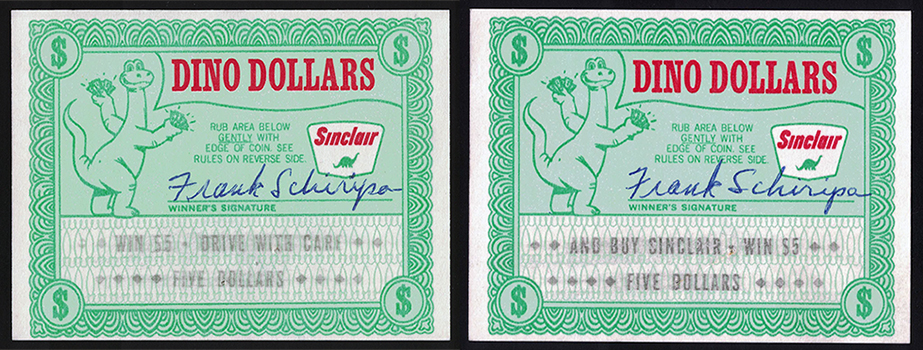
On the left is the common half of the $5.00 prize. On the right is the winning half. Sinclair Refining's 'Dino Dollars' Game (1967). Extremely rare.
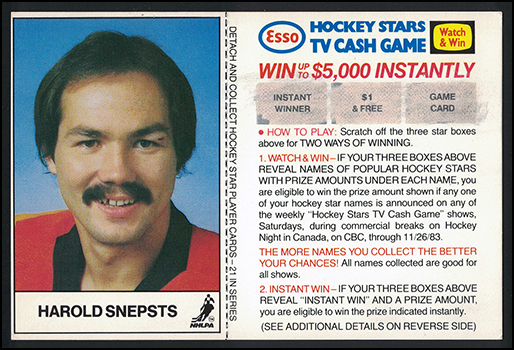
Instant Winner Game Piece, $1.00 Prize, Imperial Oil's 'Hockey Stars' Game (Canada, 1983).
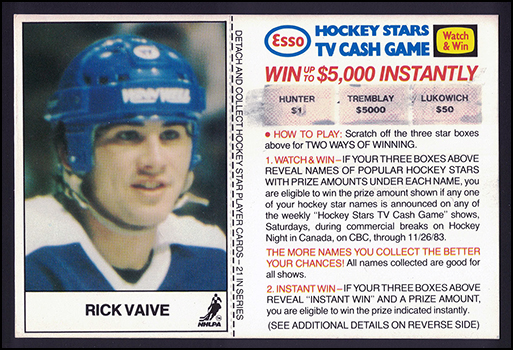
Winning Game Piece, $1.00 Prize (Dale Hunter), Imperial Oil's 'Hockey Stars' Game (Canada, 1983).

Instant Winner Game Piece, NFL Schedule Prize, Shell Oil's 'Drive To The Super Bowl' Game (1995).

Instant Winner Game Piece, Bottle of Coke Prize, Shell Oil's 'Drive To The Super Bowl' Game (1995).
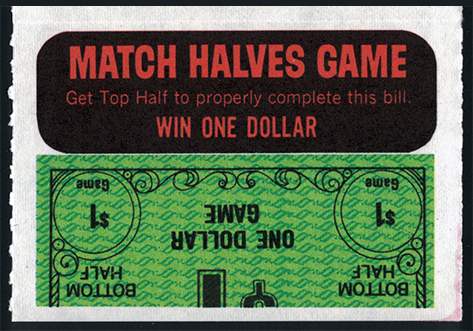
Winning Game Piece, containing the winning half (bottom half) of the $1.00 prize, Sohio's 'Boron Bonanza' Game (1969).
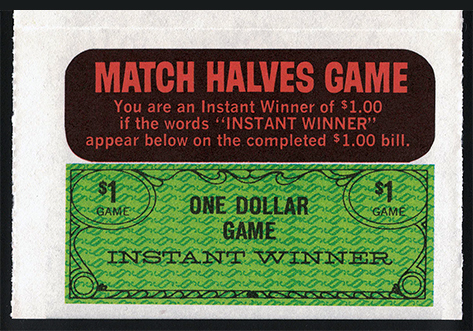
Instant Winner Game Piece, $1.00 prize, Sohio's 'Boron Bonanza' Game (1969). Scarce.
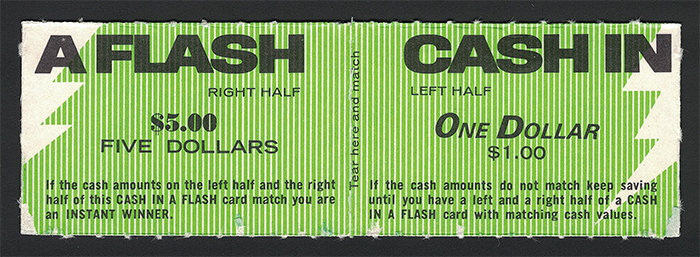
Winning Game Piece, containing the winning half (left half) of the $1.00 prize, Sohio's 'Cash In A Flash' Game (1968).
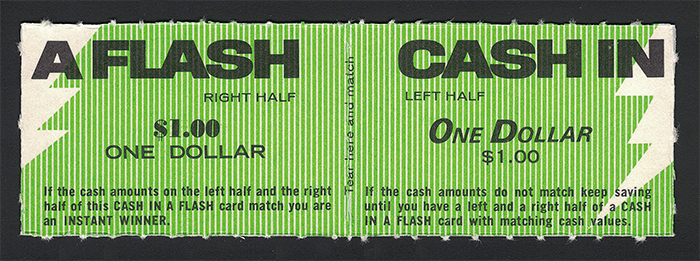
Instant Winner Game Piece, $1.00 prize, Sohio's 'Cash In A Flash' Game (1968). Scarce.
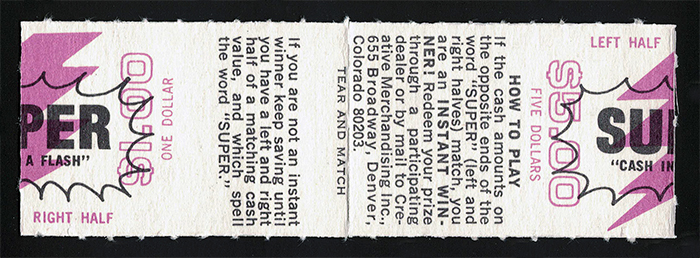
Winning Game Piece, containing the winning half (right half) of the $1.00 prize, Sohio's 'Super Cash In A Flash' Game (1967).
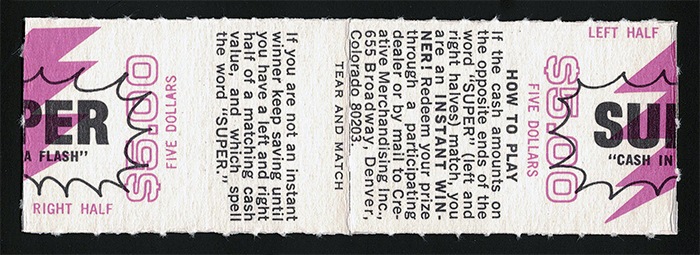
Instant Winner Game Piece, $5.00 prize, Sohio's 'Super Cash In A Flash' Game (1967). Extremely rare.
If you appreciate rare game pieces from oil company promotions, you may appreciate the following. It is a $10.00 instant winner game piece from the 1967 Sohio ‘Super Cash In A Flash’ promotion. This is the rarest game piece in my collection and possibly the only ‘Super Cash In A Flash’ $10.00 instant winner game piece in existence.
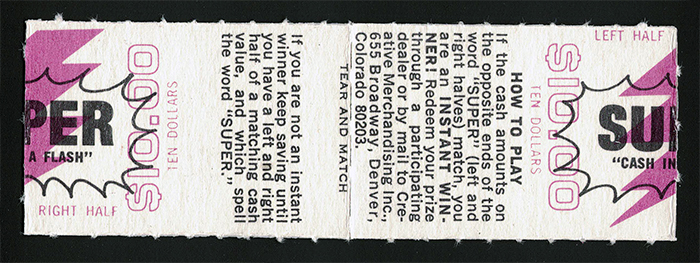
Instant Winner Game Piece, $10.00 prize, Sohio's 'Super Cash In A Flash' Game (1967). Possibly unique.
Instant Winner Hall of Fame
The prize-winning game pieces pictured above are from twenty-four different gas station game promotions that ran from 1966 to 1995. Each of these game pieces could have been redeemed for cash or prizes in the games but, for various reasons, they were not redeemed. All unredeemed game pieces are elusive and some are quite rare.
How Many Exist?
The quantity of prize-winning game pieces still in existence is unknown. Most were redeemed for prizes during the games and those are presumed to have been destroyed. For games that issued large quantities of prize-winning pieces (for example, Shell's Mr. President Coin Game) there may be upwards of 1,000 unredeemed tokens still in existence. For games that issued relatively small quantities of winning game pieces (for example, Conoco's 1998 'Classic Soul' promotion) there may not be any pieces remaining.
There are many games for which I have never seen or heard of any unredeemed key, prize-winning game pieces. That doesn't mean there aren't any in existence. It just means that - even though I've tried long and hard - I haven't found any yet.
If you have any prize-winning game pieces from any of the games, please contact me so I can add them to my census report. If you have game pieces not pictured above, and you provide photos, I will be happy to add them to the Hall of Fame. These photos are intended to be a reference source for all collectors. Send email communications to me at this address: travelbug -at- billjamie.com.
The Franklin Mint Scratch
Many prize-winning and Instant Winner coins produced by The Franklin Mint have one or more heavy scratches on them; sometimes on the obverse, sometimes on the reverse and sometimes both. These scratches occurred at The Franklin Mint at the time of manufacture (after striking but before they were sealed in packets). Some of the scratches are quite heavy and most have left a gouge in the rim. The scratches are uniform; slightly curved and all appear to have been made with the same tool. I have not been able to determine the cause or purpose of these scratches. I'm certain that the scratches occurred at The Franklin Mint because I have seen these scratches on many tokens, in many collections all around the country. No other explanation can account for a uniform and predictable scratch.
These scratches do not appear on the common coins from the games, only on the prize-winning key coins. One possible explanation is that the prize-winning coins went through an additional counting or processing machine whereas the regular coins did not. This hypothetical machine perhaps had a metal ejection finger (or some other mechanical feature) that accidentally caused a scratch in the course of processing.
Another possible explanation - though less likely - is that The Franklin Mint intentionally scratched all the prize-winning coins. Oil company promotional games are serious business, with millions of dollars (and company reputation) at stake. Tight security is necessary and The Franklin Mint employed several security measures in the execution of the games they produced. For example, all the prize-winning and INSTANT WINNER coins had secret marks placed on their dies. Perhaps the scratches are just another control measure to identify an authentic prize coin. In my opinion the scratches are not intentional. I think they happened accidentally in the course of manufacture.
Secret Marks
Between 1968 and 1992, eleven different oil company promotional games used metal ‘coins’ as game pieces. In most of the games, the dies used to strike the prize-winning coins were intentionally prepared with secret marks and these marks can be seen on the coins. The marks provided a way for game officials to confirm the authenticity of genuine coins and detect counterfeit coins. Many different measures were used to help prevent cheating. Marking the dies was just one of them.
Coins made for games like Sunoco’s Antique Car Coin Game (1969) were susceptible to counterfeiting. It was possible to grind off the obverse half of one coin (for example, a Chrysler Six instant winner coin worth $1) then grind off the reverse half of a Packard Touring Car non-winning coin, then glue the two halves together to create a $2,500 prize-winning instant winner coin. To make it easy to detect such a counterfeit, the reverse die of the Packard Touring Car instant winner coin has a unique mark that shows on the coin. A counterfeiter would need to know about this mark - and successfully recreate it on the coin - in order to fool the game officials. The counterfeiter would also need to know about – and remove – the secret mark on the Chrysler Six coin. All instant winner coins have their own unique marks and it is unlikely that a counterfeiter would know which secret marks belonged on which coin.
Coins made for Shell’s Mr. President Coin Game (and others like it) were much harder to counterfeit because the obverse designs of the prize-winning coins were not used on non-winning coins. So, for example, in order to create a Warren G. Harding $5,000 prize-winning coin, the obverse design would need to be created by a counterfeiter from scratch. This is possible, but the counterfeiter would also need to know which secret marks belong on a Warren G. Harding coin and recreate them as well. It is unlikely that a counterfeiter would know which secret marks belong on a Warren G. Harding coin which made the marking of the dies both clever and effective. Some of the prize-winning paper game pieces were also printed with secret marks.
Despite efforts to prevent it, cheating did occur during the games but usually not by customers playing the game or by counterfeiting. Cheating was mostly conducted by gas station owners and employees who found ways to detect the prize-winning game pieces without opening the protective wrapper, then cashing them in themselves.
If you study the images above you will be able to find many of the secret marks.
What Constitutes a Complete Set?
Mr. President Coin Game (Shell Oil, 1968)
Thirty-nine different aluminum game pieces were issued and that would constitute a complete set. Twenty-three are common* and sixteen are key prize winners. Of the sixteen keys, seven are shown above and two others should be obtainable. As for the remaining seven, it is questionable whether they even exist.** Therefore, a set of thirty-two different medallions may be the largest possible set that can be obtained. I have twenty-nine in my collection and I am aware of a collector who has thirty. I am not aware of anyone who has more than thirty.
Famous Facts & Faces (Shell Oil, 1968)
Thirty different aluminum game pieces were issued and that would constitute a complete set. Twelve are common* and eighteen are key prize winners. Of the eighteen keys, five are shown above and five others should be obtainable. As for the remaining eight, it is questionable whether they even exist.** Therefore, a set of twenty-two different medallions may be the largest possible set that can be obtained. I have seventeen in my collection and I am aware of a collector who has eighteen. I am not aware of anyone who has more than eighteen.
States of the Union (Version 1) (Shell Oil, 1969)
Fifty different aluminum game pieces were issued and that would constitute a complete set. Thirty-three are common* and seventeen are key prize winners. Of the seventeen keys, six are shown above and two others should be obtainable. As for the remaining nine, it is questionable whether they even exist.** Therefore, a set of forty-one different medallions may be the largest possible set that can be obtained. I have thirty-nine in my collection. I am not aware of anyone who has more than thirty-nine.
States of the Union (Version 2) (Shell Oil, 1969)
Forty-six different aluminum game pieces were issued and that would constitute a complete set. Twenty-nine are common* and seventeen are key prize winners. Of the seventeen keys, seven are shown above and one other should be obtainable. As for the remaining nine, it is questionable whether they even exist.** Therefore, a set of thirty-seven different medallions may be the largest possible set that can be obtained. I have thirty-six in my collection. I am not aware of anyone who has more than thirty-six.
Famous Americans Coin Game (Shell Oil, 1968)
The quantity of different game pieces issued depends on your opinion of what an 'issue' is. The game board has spots for the twenty-four basic obverse designs so some would say there are twenty-four in a complete set. However, three major reverse designs were used, and the Lewis & Clark medallion has two major obverse varieties. There are also many minor varieties that show subtle design changes.
In my opinion, forty-eight different aluminum game pieces were issued and that would constitute a complete set. Thirty-seven are common and eleven are key prize winners. Of the eleven keys, three are shown above and one other should be obtainable. As for the remaining seven, it is questionable whether they even exist.** Therefore, a set of forty-one different medallions may be the largest possible set that can be obtained. I have thirty-nine in my collection and I am aware of a collector who has forty. I am not aware of anyone who has more than forty.
I have cataloged twenty-nine minor varieties in this series and there are probably more. The varieties were created when The Danbury Mint prepared new dies using redrawn obverse designs, or changed the position of the portraits in relation to the lettering. By numismatic standards, many of these varieties are significant enough to qualify as a separate issue. Therefore - counting the minor varieties - at least seventy-seven different game coins were produced.
Man in Space (Shell Oil, 1969)
Twenty-six different aluminum game pieces were issued and that would constitute a complete set. Fifteen are common and eleven are key prize winners. Of the eleven keys, three are shown above and three others should be obtainable. As for the remaining five, it is questionable whether they even exist.** Therefore, a set of twenty-one different medallions may be the largest possible set that can be obtained. I have eighteen in my collection. I am not aware of anyone who has more than eighteen.
Hot Wheels Coin Game (Shell Oil, 1972)
Eighteen different aluminum game pieces were issued and that would constitute a complete set. Ten are common and eight are key prize winners. Of the eight keys, one is shown above and one other should be obtainable. As for the remaining six, it is questionable whether they even exist.** Therefore, a set of twelve different medallions may be the largest possible set that can be obtained. I have eleven in my collection. I am not aware of anyone who has more than eleven.
Presidential Coin Game (Shell Oil, 1992)
Sixteen different game pieces were issued and that would constitute a complete set. Eight are common (they were struck on brass planchets) and eight are key prize winners (they were struck on nickel-silver planchets). Of the eight keys, three are shown above. As for the remaining five, it is questionable whether they even exist.** Therefore, a set of eleven different medallions may be the largest possible set that can be obtained. I have eleven in my collection. I am not aware of anyone who has more than eleven.
Antique Car Coins - Series 1 (Sunoco, 1969)
Thirty-one different aluminum game pieces were issued and that would constitute a complete set. Twenty-five are common and six are key prize winners. Of the six keys, three are shown above. As for the remaining three, it is questionable whether they even exist.** Therefore, a set of twenty-eight different medallions may be the largest possible set that can be obtained. I have twenty-eight in my collection. I am not aware of anyone who has more than twenty-eight.
Antique Car Coins - Series 2 (Sunoco, 1969)
Thirty-one different aluminum game pieces were issued and that would constitute a complete set. Twenty-five are common and six are key prize winners. Of the six keys, two are shown above and one other should be obtainable. As for the remaining three, it is questionable whether they even exist.** Therefore, a set of twenty-eight different medallions may be the largest possible set that can be obtained. I have twenty-seven in my collection. I am not aware of anyone who has more than twenty-seven.
Landmarks of America (Sunoco, 1969)
Twenty-four different aluminum game pieces were issued and that would constitute a complete set. Twenty are common and four are key prize winners. Of the four keys, two are shown above. As for the remaining two, it is questionable whether they even exist.** Therefore, a set of twenty-two different medallions may be the largest possible set that can be obtained. I have twenty-one in my collection. I am not aware of anyone who has more than twenty-one.
Games with Paper Game Pieces
It is difficult (and in some cases impossible) to know how many different game pieces were issued in scratch card and other games that used printed game pieces. In some games there were multiple printing variations of the game pieces and records of these printings, if they even exist, are not easily found. I have made some estimates based on observation of existing game pieces and the study of promotional materials for the games. If there is a particular game you're interested in, send me an email.
Varieties
To the question 'What constitutes a complete set?' treated above, only the basic designs were considered. However, the companies that made the coins produced multiple dies for many of the game pieces, and many of the dies exhibit minor design differences. This has created dozens of varieties of the game coins. Collectors may consider that a complete set should include one each of all the varieties. I will attempt to catalog the varieties as time permits. A few examples follow.
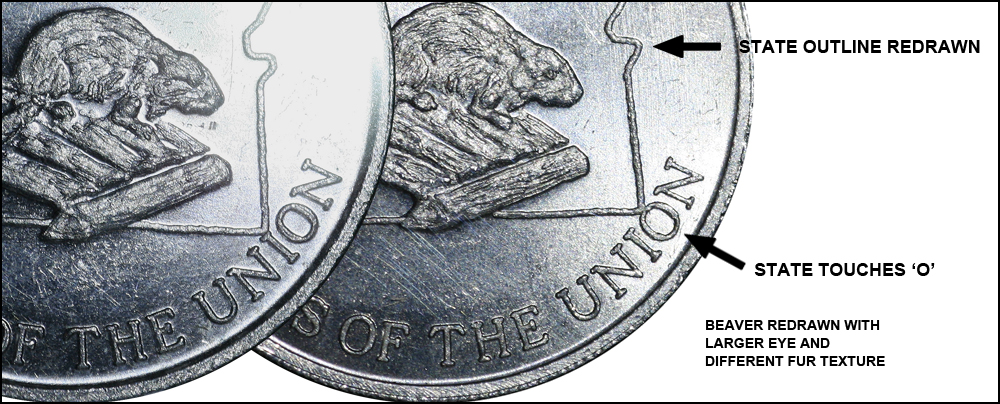
Above: Two varieties of the Oregon medallion, Shell's 'States of the Union' game - Version 2 (1969).
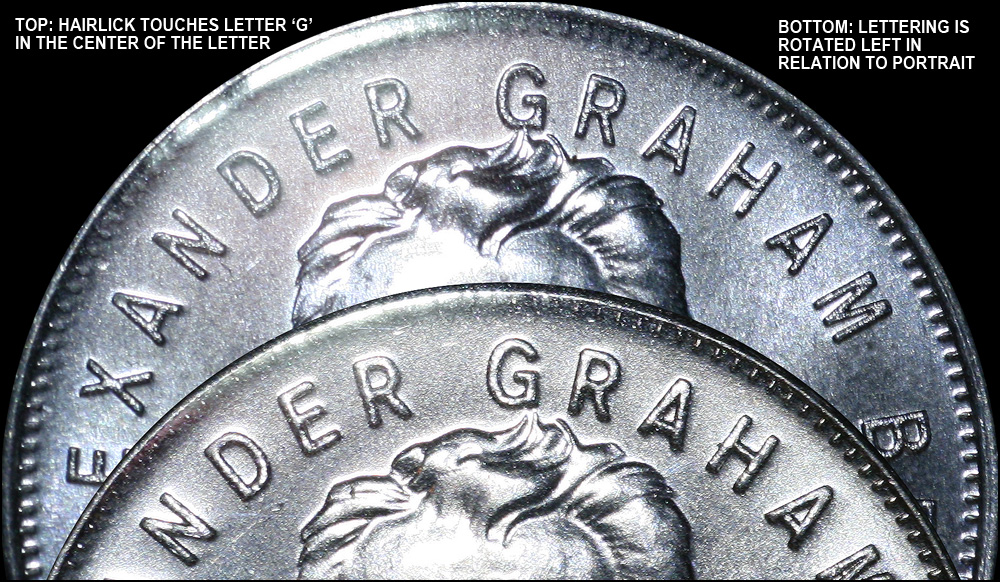
Above: Two varieties of the Alexander Graham Bell medallion, Shell's 'Famous Facts and Faces' game (1968).
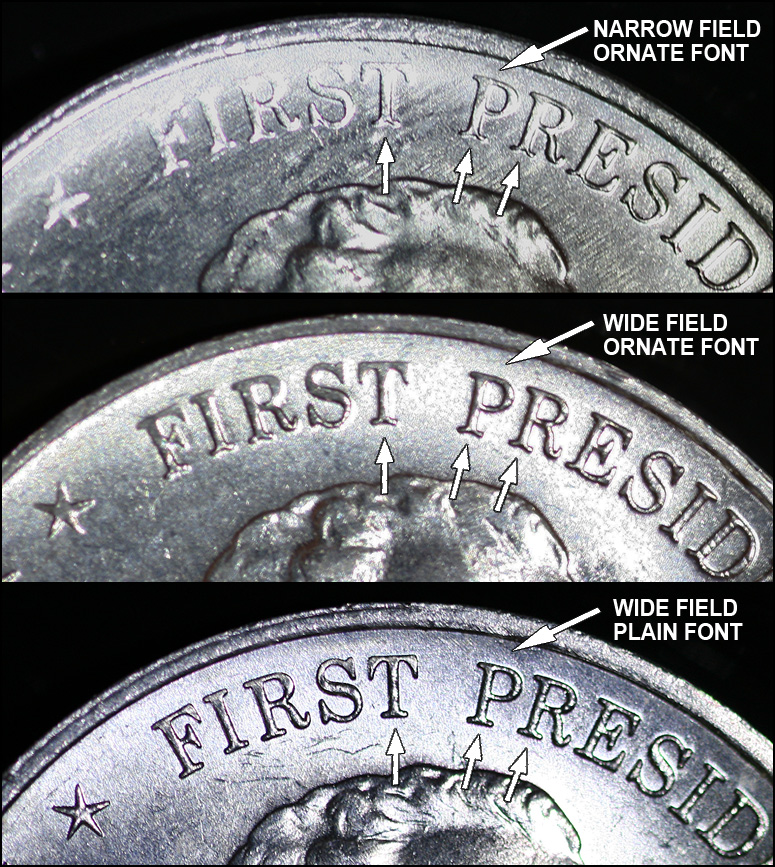
Above: Three varieties of the George Washington medallion, Shell's 'Mr. President' Coin Game (1968).
Most presidents were minted with both narrow and wide field die varieties, where the distance between the
lettering and the rim varies slightly.
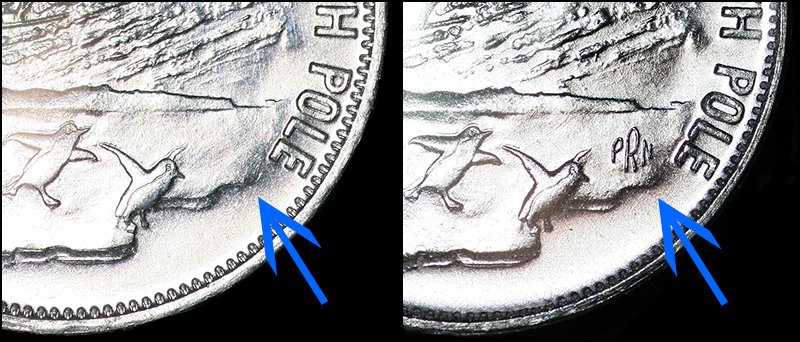
Above: 'Admiral Byrd's Flight Over The South Pole' game coin with and without designer's initials 'PRN,' Shell's 'Famous Facts and Faces' game (1968).
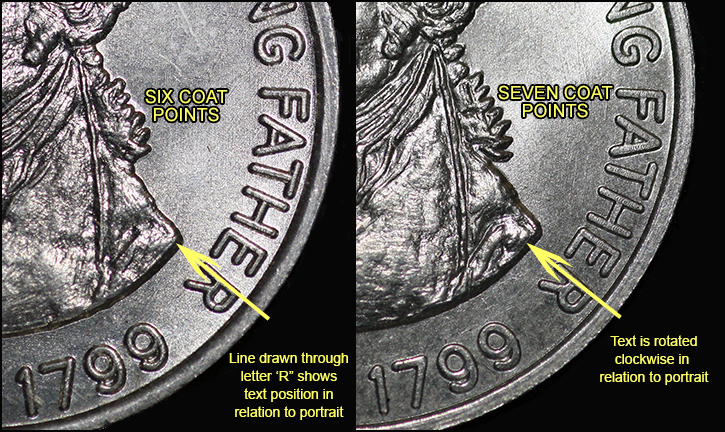
Above: In Shell's 'Famous Americans' Coin Game (1968) there are several dozen minor die varieties. Shown are two different George Washington medallions.
*Varieties exist. Some coins have multiple varieties with significant design changes.
**I've been searching for years and I have never seen one, heard of anyone possessing one, or found any reference to one ever being offered for sale. It is possible that they were all redeemed during the game and destroyed. That seems unlikely but until one is found, that hypothesis stands.
Questions and Comments are welcome. Send an email to me at this address: travelbug -at- billjamie.com.
Use your back button or Click here to return to the main gas station game page.





